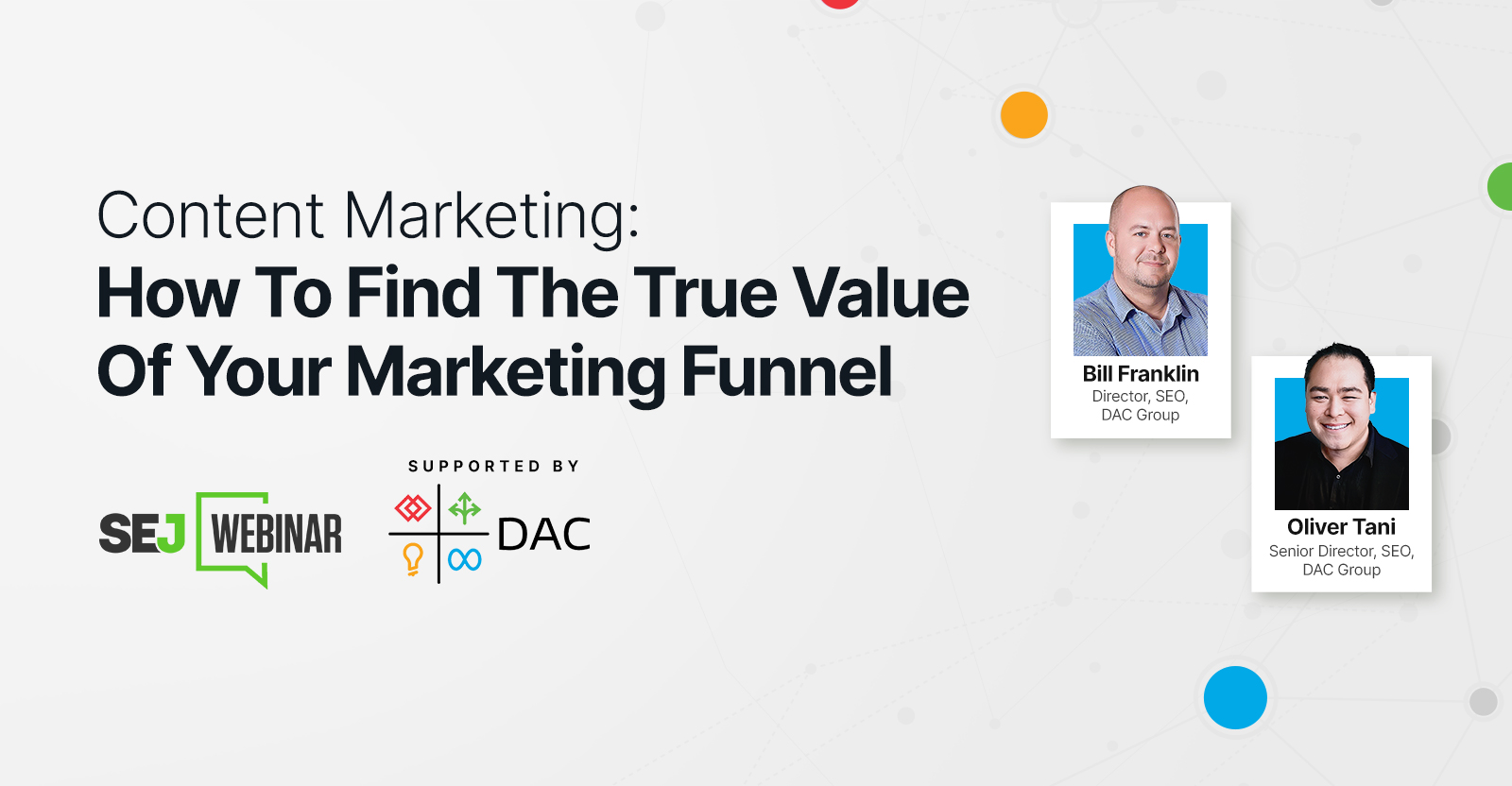SEO
Top 17 SEO Podcasts for 2021 via @martinibuster

Podcasts are a great way to keep up with the latest events in SEO.
But they can also help keep your skills up to date.
The following 16 podcasts were selected because of the trustworthiness of the information and how actionable and inspiring it is for SEO professionals.
Hosts: Loren Baker, Brent Csutoras, and Danny Goodwin
The Search Engine Journal Show podcast features interviews with top experts, discussion of SEO topics, and lots of actionable SEO tips.
Hosts: Jim Hedger and Dave Davies
This is a regularly published podcast featuring the endlessly listenable banter of Jim Hedger and Dave Davies.
Webcology gets you up to date with the latest and most interesting developments in SEO and also features guests worth listening to.
Both Jim and Dave are industry veterans with years and years of experience.
Listening to their podcast is like having a coffee break with friends.
Hosts: Ross Dunn and John Carcutt
Regularly updated SEO podcast.
Advertisement
Continue Reading Below
It’s called SEO 101 but the podcast contains information that will be relevant for all search marketers.
Host: Benjamin Shapiro
Podcast about SEO and content marketing. Their focus is on discussing actionable strategies that work plus how to obtain insights from data.
Hosts: Mat Siltala and Dave Rohrer
Mat Siltala and Dave Rohrer are experienced SEO practitioners with a wealth of professional knowledge.
They publish on a mostly weekly basis covering a wide range of advanced topics you might not find on other shows.
Recent topics include:
- Leadership and team building.
- Ways to test and improve CTR from Google and Bing.
- Tools for reusing video and audio content.
- Social media posting patterns.
- Content scheduling.
- An interview with Fabrice Canel of Bing.
Mat and Dave are generous hosts that are a pleasure to listen to.
Highly recommended.
Host: Greg Finn, Jessica Budde, Christine ‘Shep’ Zirnheld, and Mark Saltarelli
Marketing O’Clock is a weekly podcast that focuses on discussing the last weeks most important digital marketing news, all the while maintaining a sense of humor.
Advertisement
Continue Reading Below
If you are looking to not only stay up with current news and events, but also get a sense of the impact it all has on you and your work, then Marketing O’Clock is the show for you.
Host: Erin Sparks
Edge of the Web features guests who are established SEO experts.
People like Jessica Bowman, Kristina Azarenko, Google’s John Mueller, Dixon Jones, Will Critchlow, and Paul Shapiro.
This podcast is about serious get-things-done brand of SEO by experts who have been in the business for many years.
This is one of my personal favorites.
Host: Bjork Ostrom
Food Blogger SEO podcast focuses on everything to do with monetizing a website.
Even if you aren’t a food blogger, you still might get something out of this podcast.
Topics include:
- Optimizing ads.
- Scaling your business.
- Protecting your content – policies and trademarks and disclaimers.
- Running a subscription-based business.
- Write more, better, and smarter.
Also, other topics that are equally relevant for publishers of informational type content.
Host: Michael Stelzner
Podcast on topics related to using social media as a sales funnel, how to improve marketing with bots, creating content, and video that attracts customers.
This podcast is about more than gaining followers.
It’s focused on the things that matter – building traffic and increasing sales.
A fairly frequently published podcast, approximately two shows a month from Google.
It’s worth listening to because it’s created by members of Google’s Search Relations Team.
It provides a behind-the-scenes look at how decisions are made, projects Google Search is working on, and other topics of interest to the SEO community.
Will it make you a better search marketer?
Yes, this podcast will make you a better SEO professional.
The hosts touch on a wide variety of topics that provide insights into indexing, how sites are rendered, and even how algorithms treat brand new sites.
Advertisement
Continue Reading Below
Host: Laura Morelli
Regularly published podcast featuring actionable advice on the topics of:
Also other marketing ideas that are directly and indirectly related to SEO.
Host: John Jantsch
A marketing podcast that touches on the brand and on-page parts of SEO.
The host interviews leading marketing professionals, including Seth Godin, Robert Cialdini, and Ann Handley.
If those names mean nothing to you then you are in for a mind-blowing treat.
Duct Tape Marketing delves into content creation and creating traffic but it will also inspire you with topics that are indirectly related to SEO and more about marketing strategies for building a popular website.
Host: Mordy Oberstein
A regularly published podcast covering a wide range of news and topics of interest to the search marketing community.
Advertisement
Continue Reading Below
Topics include link building, recent updates, interviews with people like John Mueller, and actionable SEO strategies.
What I like best about these podcasts is how virtually every episode has something actionable to take back to the office.
Host: Amanda Milligan
A frequently published SEO and content marketing podcast featuring useful topics like:
- Making the most of user-generated content.
- Aleyda Solis discussing how to use an SEO lens to improve your content.
- Sujan Patel on how content fuels massive brand growth.
Hosts: John Wall and Christopher Penn
Frequently published podcast over topics that are directly related to online marketing such as:
- Crawl budget.
- Marketing AI.
- The power in explaining someone’s problem better than they can.
- 5 Techniques to change someone’s mind
Advertisement
Continue Reading Below
Other topics, too, that often relate to converting a site visitor to a customer.
Host: Louis Grenier
Podcast by former Senior Marketing Strategist at Hotjar.
Features interviews with successful marketers, sharing no-fluff high-quality advice on how to be successful.
Recent topics include:
- How to increase conversions.
- Choosing the right value proposition.
- How to experiment quickly and find huge wins.
- How to get journalists to actually open your email and read your stuff.
- How to create content that drives conversions and leads.
Host: Reid Hoffman, Founder of LinkedIn
Available on Spotify and Apple Podcasts.
Masters of Scale is a podcast focused on marketing and growing a business to be big.
The podcast features interviews with the CEOs and founders of some of the most wildly successful companies.
For example, you can learn the secrets of building a community from the CEO of Nextdoor.
Another episode is a discussion with the co-founder of Peloton discussing how to create super-fans.
While not directly about SEO, many of the topics are useful to anyone with an online business who desires to grow bigger, hosted by the founder of LinkedIn.
Advertisement
Continue Reading Below
More Resources:
SEO
Measuring Content Impact Across The Customer Journey

Understanding the impact of your content at every touchpoint of the customer journey is essential – but that’s easier said than done. From attracting potential leads to nurturing them into loyal customers, there are many touchpoints to look into.
So how do you identify and take advantage of these opportunities for growth?
Watch this on-demand webinar and learn a comprehensive approach for measuring the value of your content initiatives, so you can optimize resource allocation for maximum impact.
You’ll learn:
- Fresh methods for measuring your content’s impact.
- Fascinating insights using first-touch attribution, and how it differs from the usual last-touch perspective.
- Ways to persuade decision-makers to invest in more content by showcasing its value convincingly.
With Bill Franklin and Oliver Tani of DAC Group, we unravel the nuances of attribution modeling, emphasizing the significance of layering first-touch and last-touch attribution within your measurement strategy.
Check out these insights to help you craft compelling content tailored to each stage, using an approach rooted in first-hand experience to ensure your content resonates.
Whether you’re a seasoned marketer or new to content measurement, this webinar promises valuable insights and actionable tactics to elevate your SEO game and optimize your content initiatives for success.
View the slides below or check out the full webinar for all the details.
SEO
How to Find and Use Competitor Keywords

Competitor keywords are the keywords your rivals rank for in Google’s search results. They may rank organically or pay for Google Ads to rank in the paid results.
Knowing your competitors’ keywords is the easiest form of keyword research. If your competitors rank for or target particular keywords, it might be worth it for you to target them, too.
There is no way to see your competitors’ keywords without a tool like Ahrefs, which has a database of keywords and the sites that rank for them. As far as we know, Ahrefs has the biggest database of these keywords.
How to find all the keywords your competitor ranks for
- Go to Ahrefs’ Site Explorer
- Enter your competitor’s domain
- Go to the Organic keywords report
The report is sorted by traffic to show you the keywords sending your competitor the most visits. For example, Mailchimp gets most of its organic traffic from the keyword “mailchimp.”


Since you’re unlikely to rank for your competitor’s brand, you might want to exclude branded keywords from the report. You can do this by adding a Keyword > Doesn’t contain filter. In this example, we’ll filter out keywords containing “mailchimp” or any potential misspellings:


If you’re a new brand competing with one that’s established, you might also want to look for popular low-difficulty keywords. You can do this by setting the Volume filter to a minimum of 500 and the KD filter to a maximum of 10.


How to find keywords your competitor ranks for, but you don’t
- Go to Competitive Analysis
- Enter your domain in the This target doesn’t rank for section
- Enter your competitor’s domain in the But these competitors do section


Hit “Show keyword opportunities,” and you’ll see all the keywords your competitor ranks for, but you don’t.


You can also add a Volume and KD filter to find popular, low-difficulty keywords in this report.


How to find keywords multiple competitors rank for, but you don’t
- Go to Competitive Analysis
- Enter your domain in the This target doesn’t rank for section
- Enter the domains of multiple competitors in the But these competitors do section


You’ll see all the keywords that at least one of these competitors ranks for, but you don’t.


You can also narrow the list down to keywords that all competitors rank for. Click on the Competitors’ positions filter and choose All 3 competitors:


- Go to Ahrefs’ Site Explorer
- Enter your competitor’s domain
- Go to the Paid keywords report


This report shows you the keywords your competitors are targeting via Google Ads.
Since your competitor is paying for traffic from these keywords, it may indicate that they’re profitable for them—and could be for you, too.
You know what keywords your competitors are ranking for or bidding on. But what do you do with them? There are basically three options.
1. Create pages to target these keywords
You can only rank for keywords if you have content about them. So, the most straightforward thing you can do for competitors’ keywords you want to rank for is to create pages to target them.
However, before you do this, it’s worth clustering your competitor’s keywords by Parent Topic. This will group keywords that mean the same or similar things so you can target them all with one page.
Here’s how to do that:
- Export your competitor’s keywords, either from the Organic Keywords or Content Gap report
- Paste them into Keywords Explorer
- Click the “Clusters by Parent Topic” tab


For example, MailChimp ranks for keywords like “what is digital marketing” and “digital marketing definition.” These and many others get clustered under the Parent Topic of “digital marketing” because people searching for them are all looking for the same thing: a definition of digital marketing. You only need to create one page to potentially rank for all these keywords.


2. Optimize existing content by filling subtopics
You don’t always need to create new content to rank for competitors’ keywords. Sometimes, you can optimize the content you already have to rank for them.
How do you know which keywords you can do this for? Try this:
- Export your competitor’s keywords
- Paste them into Keywords Explorer
- Click the “Clusters by Parent Topic” tab
- Look for Parent Topics you already have content about
For example, if we analyze our competitor, we can see that seven keywords they rank for fall under the Parent Topic of “press release template.”


If we search our site, we see that we already have a page about this topic.


If we click the caret and check the keywords in the cluster, we see keywords like “press release example” and “press release format.”


To rank for the keywords in the cluster, we can probably optimize the page we already have by adding sections about the subtopics of “press release examples” and “press release format.”
3. Target these keywords with Google Ads
Paid keywords are the simplest—look through the report and see if there are any relevant keywords you might want to target, too.
For example, Mailchimp is bidding for the keyword “how to create a newsletter.”


If you’re ConvertKit, you may also want to target this keyword since it’s relevant.
If you decide to target the same keyword via Google Ads, you can hover over the magnifying glass to see the ads your competitor is using.


You can also see the landing page your competitor directs ad traffic to under the URL column.


Learn more
Check out more tutorials on how to do competitor keyword analysis:
SEO
Google Confirms Links Are Not That Important

Google’s Gary Illyes confirmed at a recent search marketing conference that Google needs very few links, adding to the growing body of evidence that publishers need to focus on other factors. Gary tweeted confirmation that he indeed say those words.
Background Of Links For Ranking
Links were discovered in the late 1990’s to be a good signal for search engines to use for validating how authoritative a website is and then Google discovered soon after that anchor text could be used to provide semantic signals about what a webpage was about.
One of the most important research papers was Authoritative Sources in a Hyperlinked Environment by Jon M. Kleinberg, published around 1998 (link to research paper at the end of the article). The main discovery of this research paper is that there is too many web pages and there was no objective way to filter search results for quality in order to rank web pages for a subjective idea of relevance.
The author of the research paper discovered that links could be used as an objective filter for authoritativeness.
Kleinberg wrote:
“To provide effective search methods under these conditions, one needs a way to filter, from among a huge collection of relevant pages, a small set of the most “authoritative” or ‘definitive’ ones.”
This is the most influential research paper on links because it kick-started more research on ways to use links beyond as an authority metric but as a subjective metric for relevance.
Objective is something factual. Subjective is something that’s closer to an opinion. The founders of Google discovered how to use the subjective opinions of the Internet as a relevance metric for what to rank in the search results.
What Larry Page and Sergey Brin discovered and shared in their research paper (The Anatomy of a Large-Scale Hypertextual Web Search Engine – link at end of this article) was that it was possible to harness the power of anchor text to determine the subjective opinion of relevance from actual humans. It was essentially crowdsourcing the opinions of millions of website expressed through the link structure between each webpage.
What Did Gary Illyes Say About Links In 2024?
At a recent search conference in Bulgaria, Google’s Gary Illyes made a comment about how Google doesn’t really need that many links and how Google has made links less important.
Patrick Stox tweeted about what he heard at the search conference:
” ‘We need very few links to rank pages… Over the years we’ve made links less important.’ @methode #serpconf2024″
Google’s Gary Illyes tweeted a confirmation of that statement:
“I shouldn’t have said that… I definitely shouldn’t have said that”
Why Links Matter Less
The initial state of anchor text when Google first used links for ranking purposes was absolutely non-spammy, which is why it was so useful. Hyperlinks were primarily used as a way to send traffic from one website to another website.
But by 2004 or 2005 Google was using statistical analysis to detect manipulated links, then around 2004 “powered-by” links in website footers stopped passing anchor text value, and by 2006 links close to the words “advertising” stopped passing link value, links from directories stopped passing ranking value and by 2012 Google deployed a massive link algorithm called Penguin that destroyed the rankings of likely millions of websites, many of which were using guest posting.
The link signal eventually became so bad that Google decided in 2019 to selectively use nofollow links for ranking purposes. Google’s Gary Illyes confirmed that the change to nofollow was made because of the link signal.
Google Explicitly Confirms That Links Matter Less
In 2023 Google’s Gary Illyes shared at a PubCon Austin that links were not even in the top 3 of ranking factors. Then in March 2024, coinciding with the March 2024 Core Algorithm Update, Google updated their spam policies documentation to downplay the importance of links for ranking purposes.
The documentation previously said:
“Google uses links as an important factor in determining the relevancy of web pages.”
The update to the documentation that mentioned links was updated to remove the word important.
Links are not just listed as just another factor:
“Google uses links as a factor in determining the relevancy of web pages.”
At the beginning of April Google’s John Mueller advised that there are more useful SEO activities to engage on than links.
Mueller explained:
“There are more important things for websites nowadays, and over-focusing on links will often result in you wasting your time doing things that don’t make your website better overall”
Finally, Gary Illyes explicitly said that Google needs very few links to rank webpages and confirmed it.
I shouldn’t have said that… I definitely shouldn’t have said that
— Gary 鯨理/경리 Illyes (so official, trust me) (@methode) April 19, 2024
Why Google Doesn’t Need Links
The reason why Google doesn’t need many links is likely because of the extent of AI and natural language undertanding that Google uses in their algorithms. Google must be highly confident in its algorithm to be able to explicitly say that they don’t need it.
Way back when Google implemented the nofollow into the algorithm there were many link builders who sold comment spam links who continued to lie that comment spam still worked. As someone who started link building at the very beginning of modern SEO (I was the moderator of the link building forum at the #1 SEO forum of that time), I can say with confidence that links have stopped playing much of a role in rankings beginning several years ago, which is why I stopped about five or six years ago.
Read the research papers
Authoritative Sources in a Hyperlinked Environment – Jon M. Kleinberg (PDF)
The Anatomy of a Large-Scale Hypertextual Web Search Engine
Featured Image by Shutterstock/RYO Alexandre
-

 PPC5 days ago
PPC5 days ago19 Best SEO Tools in 2024 (For Every Use Case)
-

 MARKETING7 days ago
MARKETING7 days agoStreamlining Processes for Increased Efficiency and Results
-
SEARCHENGINES6 days ago
Daily Search Forum Recap: April 17, 2024
-

 PPC7 days ago
PPC7 days ago97 Marvelous May Content Ideas for Blog Posts, Videos, & More
-

 SEO6 days ago
SEO6 days agoAn In-Depth Guide And Best Practices For Mobile SEO
-

 MARKETING6 days ago
MARKETING6 days agoEcommerce evolution: Blurring the lines between B2B and B2C
-
SEARCHENGINES5 days ago
Daily Search Forum Recap: April 18, 2024
-
SEARCHENGINES4 days ago
Daily Search Forum Recap: April 19, 2024















